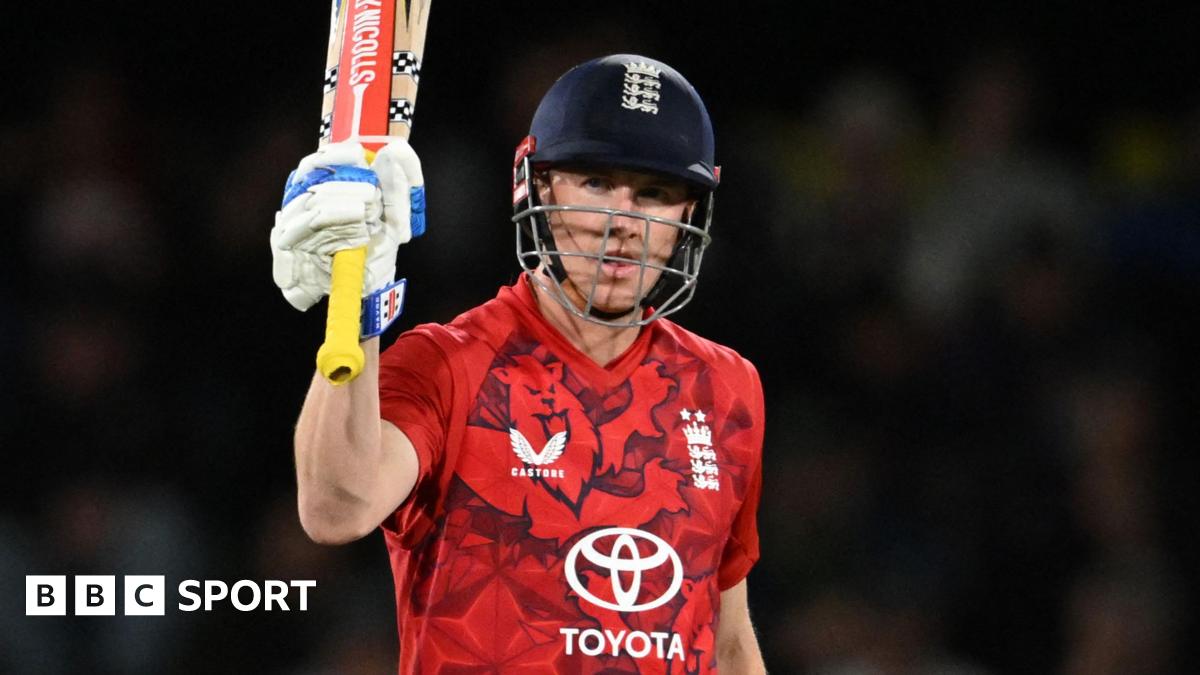Smilla Holmberg didn’t even think she was meant to be on the pitch.
The player who missed the decisive penalty in Thursday’s Euro 2025 quarter-final had spent the first half of extra time hobbling around at right-back, having twisted her ankle making a brilliant last-ditch block on Alessia Russo’s shot as England threatened to win the tie 3-2 at the end of 90 minutes.
At the interval in extra time, Holmberg made her way over towards the Sweden dugout, sat down, and stayed there. She was coming off, and reserve defender Amanda Nilden was summoned.
But it turned out Nilden was actually coming on for left-back Jonna Andersson. Sweden were about to start the second half of extra time with 10 players. It was only after frantic shouting from the other defenders that Holmberg, having presumably started to wind down, was told to stand up and get back on.
This chaotic moment summed up a remarkable football contest.
“I can’t remember anything like this,” said England head coach Sarina Wiegman after her team had fought back from two goals down to take the tie to extra time and then penalties, where they scraped through, 3-2, in a lengthy shootout.
It was a genuine epic that had several different chapters. There was the period when Sweden were threatening to blow away defending European champions England. There was the period when England found stability and played their way into the game. There was the period when England suddenly fought back and had momentum. There was a stretch during extra time when Sweden had the better of things again.

Holmberg after her crucial miss as England’s players celebrate (Alexander Hassenstein/Getty Images)
And then the penalty drama was, in itself, a shootout of almost unprecedented twists and turns. Sweden’s goalkeeper Jennifer Falk saved four spot kicks, yet ended on the losing side — in part because she missed one herself.
That the ultimate failing was by Holmberg — 18 years old, a month into her international career and a sudden national hero after scoring as they beat Germany 4-1 last week in the group phase — was a particularly cruel way for an increasingly farcical contest to end. “She’s probably one of the best penalty takers in practice,” said Sweden manager Peter Gerhardsson.
The Swedes should have won this match inside 90 minutes, and they should have won the penalty shootout, too.
Their tactics, based around heavy pressure high up the pitch, were not surprising. But somehow England seemed unprepared. Defender Jess Carter started particularly nervily, conceding possession even before her underhit pass caused panic and eventually resulted in Kosovare Asllani’s second-minute opener. Carter looked unusually sluggish when Stina Blackstenius breezed past her for the second midway through the first half.
At this point, Wiegman made a minor but crucial change: centre-backs Carter and Leah Williamson switched positions.
This is the second time Carter has changed positions in defence, having started the tournament at left-back and swapped places with Alex Greenwood. It feels like both switches were to hide Carter’s weaknesses, but the Gotham FC and former Chelsea player deserves some sympathy; before this tournament, she expressed frustration about developing a reputation as a jack-of-all-trades defender, and you wonder what she might have become had she been allowed to nail down one position.
Quietly, this change worked.
Sweden didn’t alter their pressing patterns, and so England’s free player was now the elegant Williamson rather than the nervy Carter. Williamson helped her team play their way into the game — not to launch a fightback, simply to calm the tempo and stop them losing the tie before half-time. “(Sweden) left that left side open and Jess was struggling a bit,” Wiegman said. “With Leah, we were able to start our build-up.”

Wiegman’s raft of changes paid off (Eddie Keogh/Getty Images)
The more dramatic changes came later. Much later.
Criticised earlier in the tournament for always waiting until the hour mark — even Rachel Daly and Millie Bright, members of the squad that won the Euros under her three years ago, mentioned the trend in their podcast — Wiegman waited until 70 minutes this time. It seemed the game was slipping away. And then she went all-out, making a triple change that meant England ended up with a back four, Keira Walsh on her own in midfield, and Lauren James floating behind a genuine front four.
But it was the fourth substitution, on 78 minutes, which proved crucial. Chloe Kelly, introduced down the left, twice delivered magnificent balls into the box, first for Lucy Bronze’s far-post header, and then, after a loose ball, for fellow substitute Michelle Agyemang’s equaliser.
Like so many times at Euro 2022, Wiegman’s decisions changed the game. But it was a three-step process. Her alterations stabilised the game, and then put England in charge, and then actually brought the goals. And, as Wiegman later pointed out, there were other changes too. “Beth Mead came on, and Chloe, and Michelle… but also Esme (Morgan) came on and did really well. And Niamh Charles came on, and she made a crucial header (to stop Lina Hurtig heading home) at 2-2,” she said. “And it’s really hard to come on in that intensity. That shows the strength of this team.”
Modern rules on substitutes — five permitted in normal time, and one more if the game goes to extra time — favour the sides with strength in depth. Sweden simply don’t have the playing resources to introduce top-quality reserves. They dominated extra time thanks to England’s extraordinarily open system, but only seemed likely to score from a set piece. Their fans, magnificent throughout this tournament, were particularly noisy in those additional 30 minutes, due to the presence of a keen ringleader who started the chants: striker Blackstenius’ boyfriend.
It may sound harsh, but Sweden lost this quarter-final as much as England won it; consistently refusing to take their opportunity to clinch victory. Their five missed penalties last night symbolise their five missed opportunities to win a trophy during Gerhardsson’s reign having reached the latter stages of a competition: two World Cups, two European Championships and an Olympic final shootout in 2021 that was almost as daft as this one. Back then, midfielder Caroline Seger missed when a goal would have clinched gold. They missed four of their six spot kicks that day — four different players to the five who missed here.
Sweden’s players tried to find comfort from family members at full time, although realistically their relatives seemed no less upset. It was difficult to find anyone capable of retaining a stiff upper lip. The one exception was Mila — 11 months old, daughter of centre-back Amanda Ilestedt, and putting smiles on the faces of some of the defeated players. The only Swede present not distraught was the one who had no idea what had just happened.
“We’re in football because of drama,” said Gerhardsson, who had taken charge of his final game after eight years in the job. “If there was a setlist, you wouldn’t be here. That’s football. It’s unpredictable… emotions… feelings. That’s something you need to accept.”
When asked what he was up to next, Gerhardsson thought for a second.
“Back to the hotel,” he said. “To watch the game again.”
(Top photo: Alexander Hassenstein/Getty Images)
Source link


